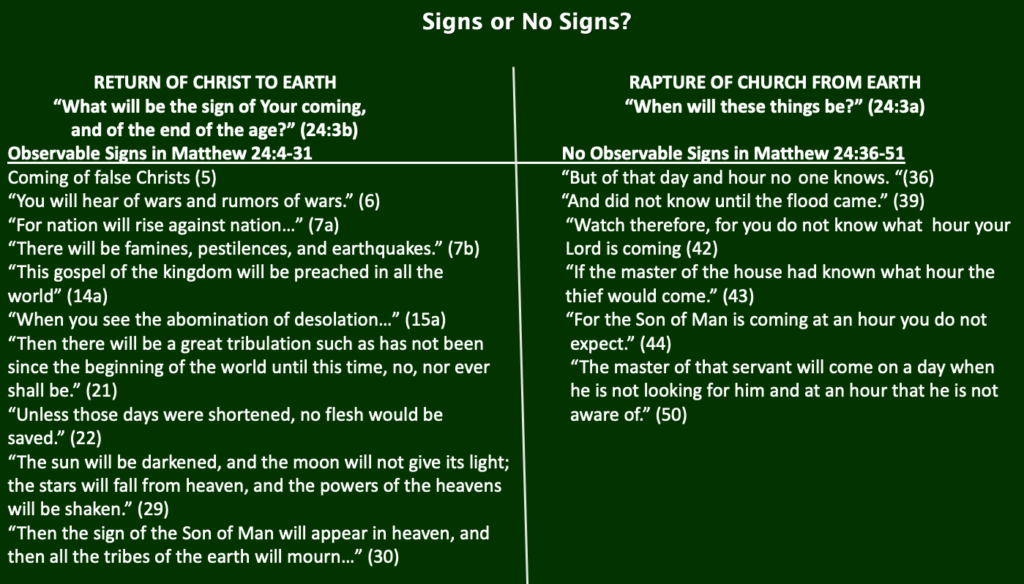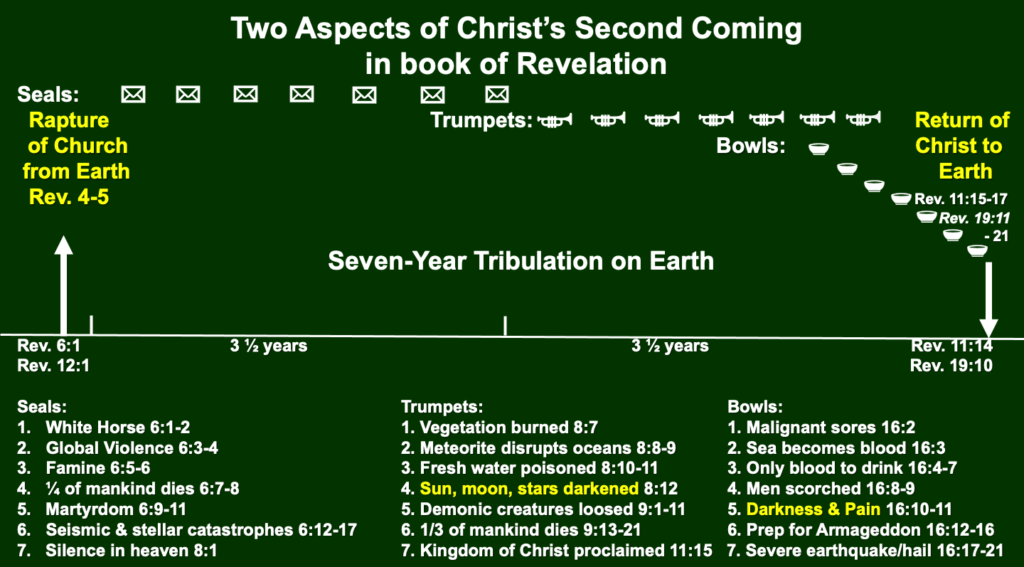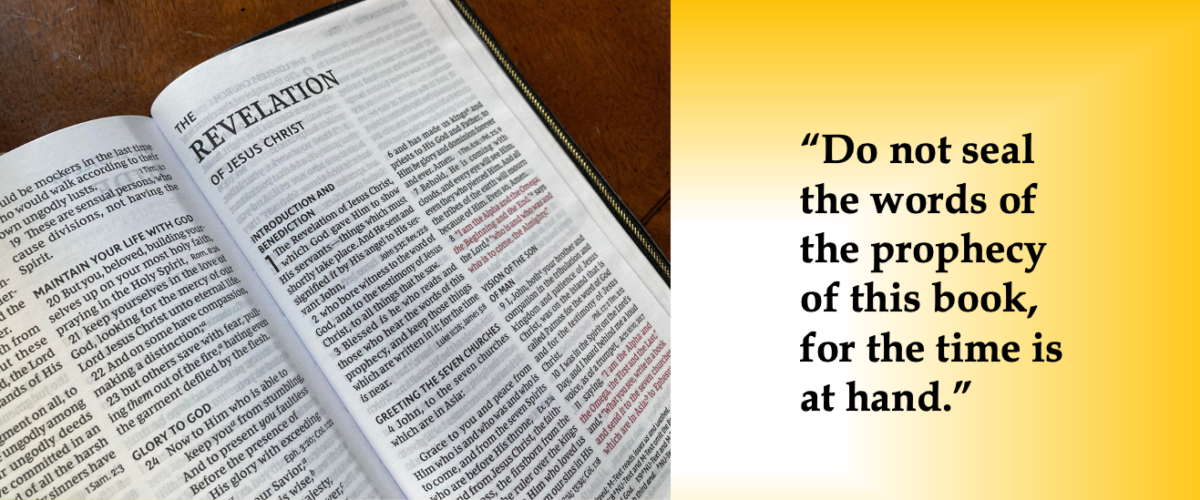
On my bike ride last Monday (April 8, 2024) while I was stopped at a stoplight, a woman walking her dog asked me if I was waiting for the eclipse. I said the coming of Christ is more important to me than the coming of a solar eclipse. [1] She agreed, but then she asked if the solar eclipse was a sign that Christ’s coming is near, citing Jesus’ words from His Olivet Discourse, “Immediately after the tribulation of those days the sun will be darkened, and the moon will not give its light…” (Matt. 24:29) prior to Christ’s return to earth (Matt. 24:30-31). About three weeks ago while I was driving my wheelchair van at work, a client’s caregiver said her church taught that this solar eclipse was the last chance for people to get right with God because Jesus was coming back to earth at that time.
Is this solar eclipse one of the signs that Jesus spoke of regarding His coming to earth? Well, the solar eclipse has come and gone, but Jesus did not return to earth. Should this surprise us? No. Why do I say this?
Because there are no prophetic signs that must take place before Jesus comes back for His church. Those who conclude that Jesus’ reference to the darkening of the sun prior to His return to earth refers to this recent solar eclipse are confusing two different aspects of Jesus’ Second Coming which Christ alludes to in Matthew 24.
When His disciples ask, “When will these things be? And what will be the sign of Your coming, and of the end of the age?” (Matt. 24:3), Christ answers the second question (“And what will be the sign of Your coming, and of the end of the age?”) first in Matt. 24:4-35 which describes the seven-year Tribulation period that will contain many “signs” of the nearness of Jesus return to earth. This is designated by the words “the sign” (to semeion) used only in verses 3 and 30. Jesus begins with a survey of the entire seven years (Matt. 24:4-14) followed by a closer look at the last half of the seven-year Tribulation (Matt. 24:15-28).
Then in verse 29 Jesus uses the phrase, “Immediately after the tribulation of those days…” to introduce His description of His Second Coming described in Matthews 24:30-31. Christ explains in Matthew 24:32-35 how the events of the seven-year Tribulation He just described (Matt. 24:5-31) are like the springtime budding of the fig tree. Just as the budding of the fig tree in the spring signals the nearness of summer, so the events that take place during the Tribulation provide clear evidence of the nearness of Christ’s Second Coming. Throughout Matthew 24:5-31 there are many observable “signs” or “warnings” that signal Christ’s future return to earth. In Matthew 24:32-35 Jesus commands His disciples to “learn this parable from the fig tree” and “When you see all these things, know that it [His return to earth] is near.”
But when we come to Matthew 24:36, Jesus says, “But of that day and hour no one knows.” Now Jesus is talking about His coming without any preceding observable signs that signal His return. Jesus is talking about two different aspects of His Second Coming – one that involves observable signs(Matt. 24:4-31) and one that involves no observable signs (Matt. 24:36-44). (see chart)

The Greek phrase “But of” (peri de) that Jesus uses in Matthew 24:36 at the beginning of the sentence marks a new section of thought that looks back to the previous material to answer an unanswered question. Hence, Jesus answers the disciples’ first question (“When will these things be?”) in verse 3 about when the end-time events will begin. Because of this major transitional marker (peri de), “the coming of the Son of Man” (Matt. 24:37) is referring to a different phase of the Lord’s return.
The peri de (“But of”) of verse 36 is followed by the phrase “that day and hour.” In Matthew 24, only the phrase “those days” (plural) had been used (24:19, 22, 29). But in verse 36, Jesus changes to “that day” (singular). Why? Because He is transitioning to talk about the Old Testament “day of the Lord” which was considered an imminent event – it could take place at any moment (Ezek. 30:3, 9; Joel 3:14, 18; Zeph. 1:7-15). The apostle Paul also uses “day” for the imminent day of the Lord in I Thessalonians 5:4 where he is speaking of the sudden removal of the church prior to the wrath of God during the Tribulation period (I Thess. 4:13-5:11; cf. 1:10). Both the pretribulational rapture and day of the Lord are illustrated by the thief in the night imagery which is an imminent event (cf. Matt. 24:43; Luke 12:39-40; I Thess. 5:2; 2 Pet. 3:10).
After Jesus looked at the events of Daniel’s 70th week of years as a whole (Matt. 24:4-35), He now talks about the beginning of that week (Matt 24:36-44) which will catch everyone by surprise. Jesus explains that the coming of “that day and hour” will be like “the days of Noah” in which people “were eating and drinking, marrying and giving in marriage, until the day that Noah entered the ark, and did not know until the flood came and took them all away, so also will the coming of the Son of Man be” (Matt. 24:38-39; cf. Luke 17:27-28 where a similar description of the days of Lot is given). The lifestyles described in the days of Noah and Lot have existed in every generation since the early days of human history. These lifestyles are ones of normalcy and indifference.
In Matthew 24:41-42, two men are working in a field and two women are grinding at the mill which also focuses on normal, unsuspecting lifestyles. Jesus’ point in Matthew 24:37-39 is that just as normal and unsuspecting lifestyles existed prior to the great worldwide judgment of the flood in Noah’s day, so too normal and unsuspecting lifestyles will exist prior to the sudden beginning of the day-of-the-Lord judgments which begin after the Rapture of the church. The people of Noah’s day “did not know” about the coming worldwide flood “until the flood came and took them all away” (Matt. 24:39). Is it likely that the world will not know about the devastating judgments that have been inflicting it during the past seven-year Tribulation (Matt. 24:5-31; cf. Rev. 6:6-17)? Not likely. It is much better to understand Jesus’ Noah illustration corresponding to the time of the sudden arrival of the day of the Lord and the pretribulation rapture.
The word “taken” in Matthew 24:40-41 refers to believers being taken in the rapture before the Tribulation. While Jesus uses the word airo (“took…away”) in Matthew 24:37 to refer to unbelievers being taken in judgment by the Flood, He uses a different word for “taken” (paralambano) in Matthew 24:40-41. This Greek word, paralambano, has the meaning of “take into close association, take (to oneself), take with/along.[2] It conveys the idea of personal accompaniment. In other words, believers will be taken to be with Christ forever at the rapture of the church (cf. I Thess. 4:15-17). Two days after His teaching in Matthew 24, Jesus used the word paralambano in John 14:3 to describe the taking of believers in a pretribulational rapture – “And if I go and prepare a place for you, I will come again and receive [paralambano] you to Myself; that where I am, there you may be also” (John 14:3).
This understanding is substantiated further by the word for “left” (aphiemi) in Matthew 24:40-41 which has the idea of “abandon” when its object is a person (cf. Matt. 4:11, 22; 8:15; 13:36; 19:29; 22:22, 25; 26:56, etc.). God will never abandon believers (Heb. 13:5). Two days after Jesus’ teaching in Matthew 24, He used aphiemi in John 14:18 when He said, “I will not leave [aphiemi] you as orphans; I will come to you” (John 14:18). Rather than referring to unbelievers being taken to judgment and believers being abandoned by the Lord in Matthew 24:40-41, Christ is referring to believers being taken to be with Jesus forever at the rapture of the church and unbelievers being abandoned to face God’s wrath during the seven-year tribulation period on the earth. The judgments of the day of the Lord will come on unbelievers and they will not escape (I Thess. 5:3).
Jesus employs “the thief” imagery in Matthew 24:42-44 to encourage His disciples to “watch” and “be ready” for His any-moment coming for them. This thief imagery is also used in several other prophetic passages dealing with the rapture and day of the Lord, most importantly I Thess. 5:2-4 and 2 Peter 3:10. A thief depends upon the element of surprise. He does not give any forewarning of his coming. Hence, the thief imagery used in Matthew 24:42-44 must refer to the pretribulational rapture of the church which has no observable signs prior to it (Matt. 24:36-44). But the Second Coming of Christ to earth at the end of the tribulation has many observable signs (Matt. 24:5-31).
The use of the word “watch” (gregoreo) in Matthew 24:42-43 in connection with the thief imagery conveys the idea of imminency – it could happen at any moment. Gregoreo occurs several times in prophetic passages taught by Jesus (Matt. 24:42, 43; 25:13; Mark 13:34, 35, 37; Luke 12:37) and the apostles Paul ( I Thess. 5:6, 10) and John (Rev. 3:2, 3; 16:15). Eight of the twelve uses of gregoreo in prophecy take place with the thief imagery (Matt. 24:42-43; Luke 12:37-39; I Thess. 5:2-10; Rev. 3:2-3; Rev. 16:15). Even in non-prophetic passages, imminency is connected to the use of the verb “to watch” (cf. Matt. 26:45; Acts 20:31; I Pet. 5:8). It is most appropriate to understand Jesus’ command to “watch” or be “alert” (gregoreo) in connection with the thief imagery in Matthew 24:42-44, to refer to an imminent, pretribulational return of Christ prior to the tribulation period. Hence, we can be confident that the apostle Paul’s use of the verb “to watch” in I Thessalonians 5:6 and 10 in the context of an imminent pretribulational rapture was derived from Jesus’ use of the same word in Matthew 24:42-44 where He stressed watchfulness in the context of His imminent pretribulational rapture.
Hence, when people mistakenly refer to the recent solar eclipse as a sign of the nearness of Christ’s return to earth, they are confusing the second aspect of Christ’s coming which will be preceded by observable signs (i.e. the sun darkening, etc.) with the first aspect (i.e. the rapture or removal of the church) which will not be preceded by observable signs (see chart).

Before I left the woman who asked me about the solar eclipse being a sign of the nearness of Christ’s coming, I told her that Jesus’ coming for His church could happen at any moment. There are no prophetic signs that must take place before He comes for those who are His. The key is to be ready for His return.
If you are not certain you have the gift of eternal life from Jesus and that you will go to heaven when Christ comes for His church at any moment, you can receive His gift right now. Jesus said, “He who believes in Me has everlasting life.” (John 6:47). Are you persuaded that Jesus was speaking the truth when He said this, and He is therefore worthy of your trust? If so, then Christ guarantees you now have everlasting life, and you will enter His heaven in the future whether you die first (2 Cor. 5:6-8; Phil. 1:21-23) or He comes back while you are alive (I Thess. 4:15-17).
If you do know you have everlasting life as a result of believing in Jesus (I John 5:13), it is important not to let anything eclipse the light of the Son in your life. The recent solar eclipse occurred when the Moon passed between the Earth and the Sun and blotted out all or some of the Sun’s light, depending on where you live. When we permit someone or something to come between us and the Son that blocks His light from reaching us, we experience broken fellowship with Jesus. The key is for us to remain open and honest before the Son, Who is light (I John 1:5-7). When God reveals sin in our lives, we simply confess that sin to Him, and He is faithful and just to forgive that sin and cleanse us of all our unknown sins or unrighteousness (I John 1:9).
FOOTONOTES:
[1] According to NASA there has been an average of 2-3 solar eclipses of all kinds each year every 1,000 years and about 2 total solar eclipses every 3 years (retrieved on April 12, 2024, from https://science.nasa.gov/eclipses/future-eclipses/eclipse-2024/faq/).
[2] Walter Bauer, A Greek-English Lexicon of the New Testament and Other Early Christian Literature, 2000 Kindle Edition, pg. 767.









